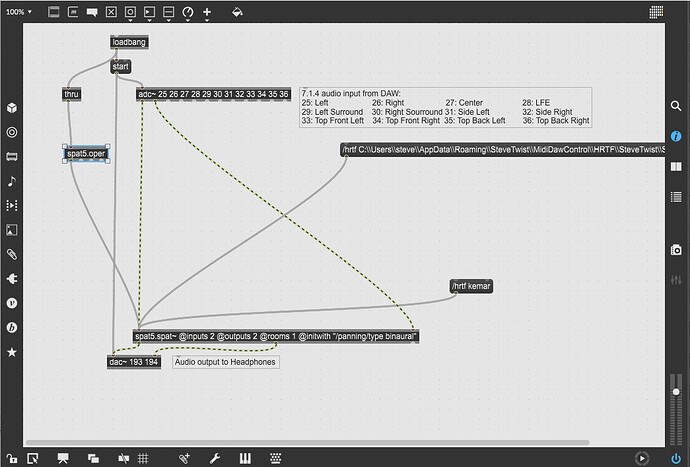Hello,
I have a personal HRTF from Genelec Aural ID in SimpleFreeFieldHRIR format (48kHz sample rate, 836 positions, 1024 data samples per FIR). Whenever I load that HRTF into spat5.spat~ my CPU spikes to 100% and my audio drops out.
I’m trying to use SPAT to simulate a 7.1.4 monitoring setup. I’ve setup 12 inputs (one for each speaker), set the room and input properties, and I’d like to render that in binaural using my personal HRTF. However, I cannot find a way to do this without overloading the CPU (even trying just 1 input causes CPU spikes and audio drop outs).
My system: Windows 10, 64bit, Intel i7-5820 6-core 3.3GHz CPU (so, a little old, but I’d hope it could handle this). RME audio card, ASIO drivers, 1024 samples (tried with larger buffers and it made no difference). Max/MSP “Signal Vector Size” is also set to 1024 samples.
I tried using spat5.binaural~ (in case the source/room properties of spat5.spat~ were causing the CPU usage), but I experience the exact same problem with that object, also.
I read on this forum that SimpleFreeFieldSOS is less CPU intensive. Testing HRTFs from the IRCAM database, it appears this is true - I can use SimpleFreeFieldSOS (about 20%-30% CPU usage), but I cannot use any SimpleFreeFieldHRIR without 100% CPU usage.
I’ve spent a few days searching online for ways to convert SimpleFreeFieldHRIR into SimpleFreeFieldSOS SOFA format, and I’ve not been able to find any tools or even programming APIs that appear to do this. (The closest I found was this matlab script, but it doesn’t support converting to SOS, only from SOS: SOFAtoolbox/SOFAconvertConventions.m at master · sofacoustics/SOFAtoolbox · GitHub)
Does anyone know of a way to convert SimpleFreeFieldHRIR into SimpleFreeFieldSOS?
Or, perhaps, something I might be doing wrong with how I’m using spat/Max?
Is it possible to render 7.1.4 to binaural in realtime? Am I being too ambitious?
Any advice or guidance is most appreciated. Thank you.
Steve

